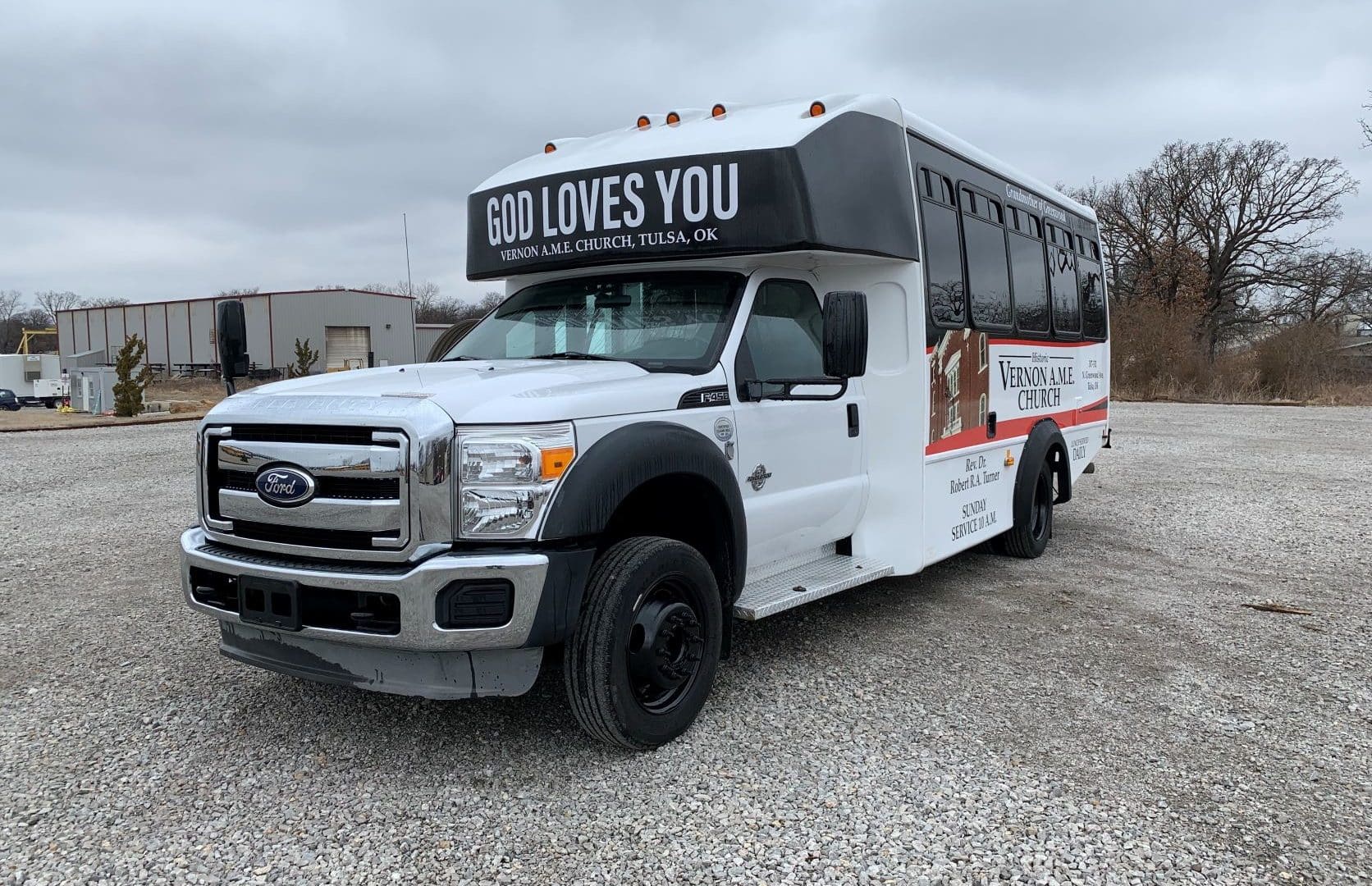By Steve Henshaw
When you’re looking for a church bus, it’s important that you have a reputable dealer who will represent you and assist in the process of buying, selling, and trading. The bus dealership you invest in should have years of experience. You want to avoid a company that is new to the industry and has yet to prove itself, and want to avoid buying from an individual seller.
Before buying a bus, it’s beneficial to go over your reasoning and purpose for purchasing one. Church transportation is important. The church bus you buy should be a part of your church family, ready to serve the needs of the congregation.
Every church is unique. Your church’s atmosphere, culture, and members all provide a foundation for its growth as a congregation. For example, your church leadership may need to consider the transportation needs for members and staff when you want to travel on an outreach trip. The amount of transportation you plan to provide, member transportation, and additional outreach opportunities available are key components to consider when deciding what type of bus to purchase. Before you make a decision, use our guide as a resource to help you when deciding which option is best for your church. Owning a bus comes with an abundance of benefits you may not have considered.
Church buses are a crucial part of any church’s business plan and can often serve as the backbone that holds an entire ministry together. However, some people may not be aware of the benefits they can provide to meet their needs. A church bus can help your church in many ways, including increasing attendance to events. Community service opens the doors of your church campus to those who need help. A church bus can help transport members of your congregation who might otherwise be left out.
- Never Buy From an Individual Seller
If you’re buying a used bus from an individual, you need to be careful. If a price sounds too good to be true, often times, it is. There are many reasons why it’s safer to go with a dealership, including professional mechanics, knowledge and availability of bus parts, and the paperwork involved in the sale.
When you’re buying from a random seller, there are so many things that could go wrong, the biggest risk is the bus could be a total lemon. Bus dealerships have a reputation to uphold, and they aren’t going to let that die on the side of the road with a bus that is not in good condition. A good bus dealer will have a full service department with professional mechanics that can give used buses the maintenance needed before hitting the road again. A bus dealer is going to make sure the bus meets all safety requirements and offers different levels of reconditioning packages on used buses. They will disclose pertinent details of any buses you are considering and ensure you have all the details needed to make an informed decision.
- Determine How you Will Use Your Bus
Recent studies have shown that having transportation options available to the elderly and people with disabilities, increase the number of people who attend church regularly. People who contribute to a congregation are happier and feel more comfortable asking for help, than those who cannot find a ride to worship services. Community outreach is a force that can help to create strong relationships and enhanced unity within a church body and with other members of local congregations. Your church bus allows you to go further than ever before. From religious events, to community outreach and transportation to other churches, your church bus will allow you to see the whole WORD from a new perspective.
No matter what you use them for, church buses are very versatile and can be used in a variety of creative ways:
- Food ministries on the go
- Mission trips
- Children’s transportation
- Church attendance for the elderly and disabled
- Conventions
- Faith-based concerts
- Youth outings
- Check for Positive Reviews
When it comes to buying a church bus, finding a reputable dealer is difficult. If you are purchasing out of state, the chances are higher that you will not be able to test drive or even see the vehicle before purchasing it. For this reason, it’s important that you find a dealer that other buyers trust and respect.
When evaluating dealers online, look for their star rating. If the dealer has several negative written comments on sites like Better Business Bureau and Google, it might be best to stay away from them.
On the other hand, if they have high marks across the board and positive reviews from their customers, you can feel confident in using them as your dealer. Here’s one tip for sifting through reviews: use different sources and read both negative and positive comments. You will get a full picture since most truthful reviews will fall somewhere in between “awesome experience” and “worst ever!” You can probably dismiss negative reviews that don’t provide a reason for leaving them because most angry patrons love to articulate why they are leaving disparaging remarks. Sometimes issues are out of the control of the dealer, so also check how they respond to a legitimate complaint. On the flip side, if a dealer has minimal ratings, a low social media profile, and an inaccessible website, it might be a red flag.
- Watch for Major Red Flags
Hiding rust with thick layers of undercoating is something unscrupulous dealers have been known to do. Opt for rust free Southern buses when you can. Ask the dealer for undercarriage photos. Be leery of dealers who add the undercoating before you’ve had a chance to inspect it. Don’t be afraid to scrape away several areas of the undercoating during an inspection to make sure there is not hidden rust, it can be the silent killer of any bus.
- Determine Key Features You Need
When it comes to purchasing a bus, the price tag is often one of the most important factors. You want to get a quality vehicle at an affordable price, but sometimes that’s easier said than done. Going over in detail what you should look for in a bus gives you a thorough breakdown of the actions you need to take. With this in mind, answering these questions will help you determine what kind of bus you are looking for:
- How many passengers do you plan to transport? Determine the least amount of passengers you expect, and consider how many you want to be able to provide transportation for, then share this with your dealer.
- Do you want a bus that’s highly accessible for those in a wheelchair?
- Will this bus be able to hold enough equipment for your use?
- Do you expect to put a lot of miles on your bus? An older bus with fewer miles is better off than a newer bus with more miles. If the dealer doesn’t reveal the mileage, ask!
- Not all engines are the same, do you want excellent gas mileage or a more powerful motor? You might prefer a powerful engine; however, the bigger the engine, the more gas it guzzles. Determine what is more important to you.
- Will you be driving your bus on the highway or neighborhood streets? Will you be in an environment with a lot of salt, sand or snow? There is nothing wrong with adding an undercoating to prevent damage in Northern climates.
- With the areas you’ll be traveling, do you need heat and air conditioning? What other comfort features could you possibly need?
- Know Your Warranty Options
When you’re buying a bus, you want to make sure that you’re getting something that’s going to last. The last thing you want is to drive away from the dealership, only to have your church bus break down a few months later. It’s important that you choose a dealer that offers a warranty so that if any problems occur during the warranty period, they’ll be covered. You can usually extend the warranty further if certain conditions are met—for example, if the dealer agrees to give you an extended warranty on a late model, low mileage bus.
You can tell a lot about the dealership you are working with, and the condition of the bus, based on their offer of a basic warranty or an extended warranty. Based on initial conversations with a sales manager, you’ll find out quickly if they want to be a partner that guides you to the right bus for your needs, or if they are trying to push you to buy something that does not check all your boxes. If a dealer refuses to offer a warranty, it is a red flag that they don’t trust their products or aren’t confident in their ability to provide repairs if necessary.
- Financing Options to Help Your Budget
Buying a bus can be a challenging process, but it does not have to be. A good dealer with offer you different types of payment options. Finding a dealer who can provide financing as an option that will allow you to purchase your bus with minimal effect on your day-to-day church operations budget.
Summary
Going over in detail what you should look for in a bus dealer gives you a thorough breakdown of the actions you need to take. But let’s wrap this up with a quick recap of the step-by-step process:
- Always buy from a dealership.
- Find a bus that checks most your boxes.
- Check the reviews and ratings of the dealership.
- Look for a rust free Southern bus.
- Make sure your key features are available.
- Get a warranty in the purchasing contract.
- Consider financing.
Steve Henshaw is chief executive officer of National Bus Sales, the first company to bring reconditioned buses to market, www.nationalbus.com/Church-Buses-For-Sale.php.






